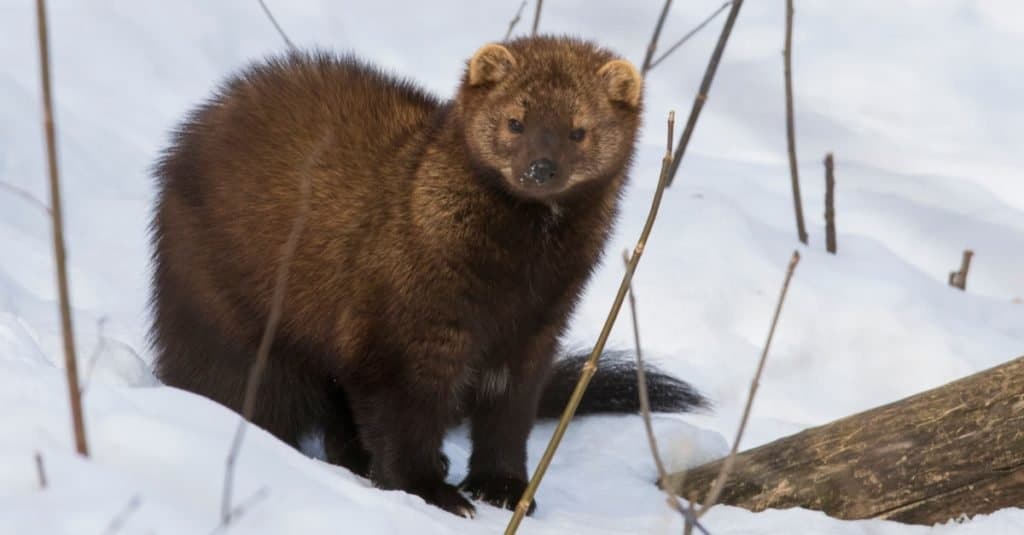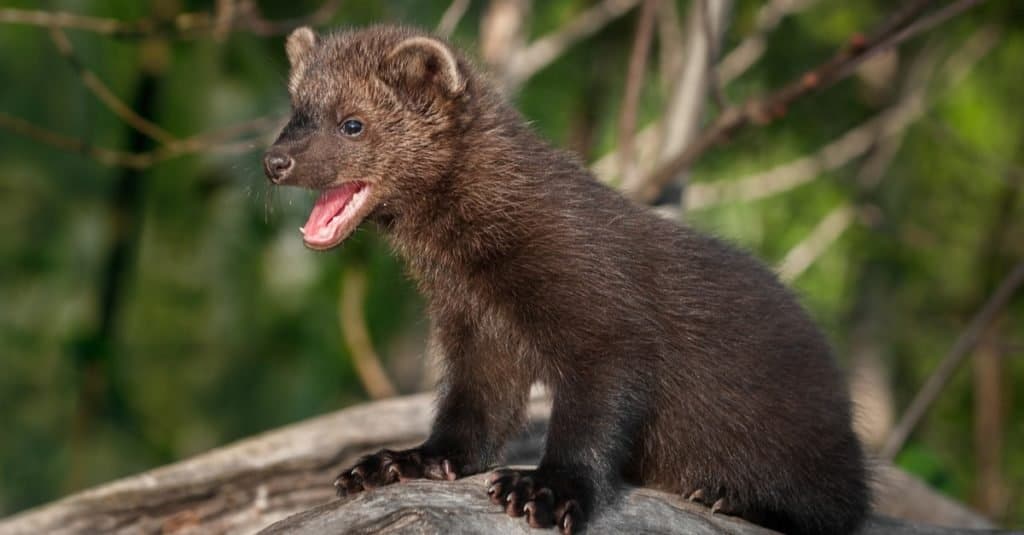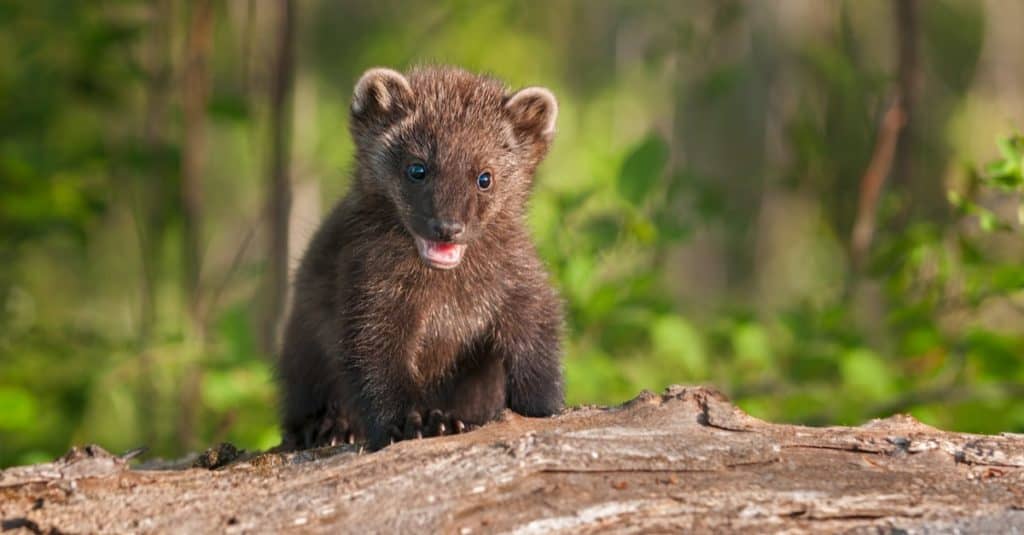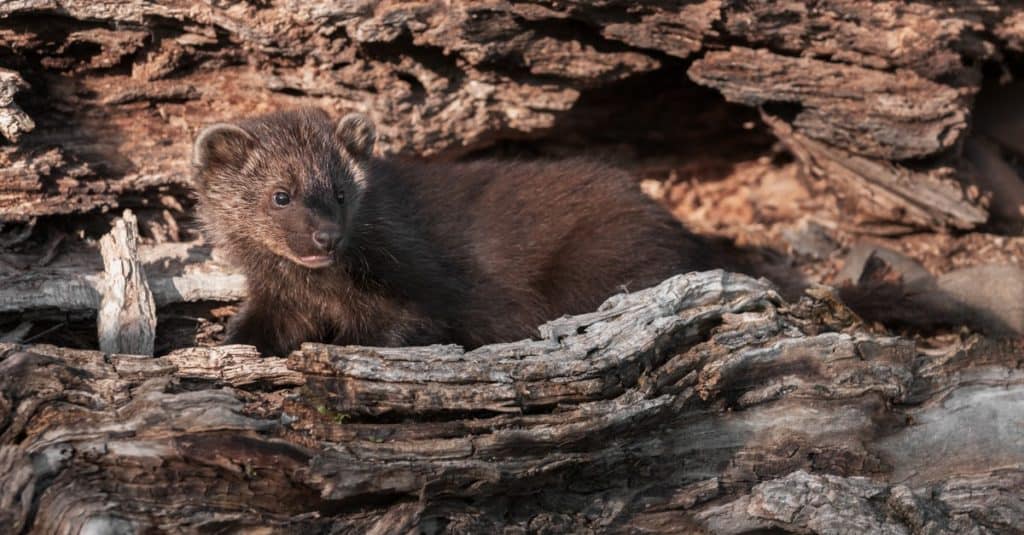If you’ve ever wondered what fisher cats eat in the wild and in captivity, you’re exactly where you need to be, as we’ll tell you everything about their diet! Keep reading to learn incredible facts about what they eat, how they hunt, and whether they’re dangerous to humans and pets!
What Are Fisher Cats?

Fisher cats are small mammals native to North America.
©Mircea Costina/Shutterstock.com
Fisher cats are small mammals native to North America and belong to the Mustelidae family. They prefer living in conifer and mixed-hardwood forests. Although they are excellent climbers, they spend most of their time on the forest floor. Fisher cats are found throughout North America’s northern forests.
People often mistake fisher cats for American martens, although they are larger. Fishers have long, thin, and low-to-the-ground bodies. Male fisher cats are much larger than females, measuring 35 – 47 inches in length and weighing 8 – 13 pounds. Female fisher cats measure 30 – 37 inches long and weigh 4 – 6 pounds. The largest male fisher cat weighed 20 pounds!
Male fisher cats have coarser coats than females. Moreover, their fur changes depending on the season. During winter, they have dense and glossy coats measuring 3 inches on the back and 1 inch on the chest. Their coats get darker during winter. In the summer, fisher cats undergo molting, and their coats have lighter shades.
What Do Fisher Cats Eat?

Fisher cats eat insects, berries, nuts, or mushrooms occasionally.
©Holly Kuchera/Shutterstock.com
Fisher cats are omnivorous animals. They usually hunt animals that are roughly the same size or smaller. Their primary food sources are snowshoe hare and porcupine. Sometimes they prey on chipmunks and shrews. However, they eat insects, berries, nuts, or mushrooms occasionally. They may also eat mountain beavers, birds, small mammals, deer, wild turkeys, bobcats, and Canada lynxes.
Top 10 Foods Fisher Cats Eat
Here’s a list of 10 foods fisher cats prefer eating:
How Do Fisher Cats Hunt?

Fisher cats are small creatures and usually hunt alone.
©Holly Kuchera/Shutterstock.com
Although fisher cats are excellent climbers and would be able to get anything they want from the trees, they’ll more likely stay on the forest floor and eat what they can find around trees.
Fisher cats are small creatures and usually hunt alone. They’re fierce predators, managing to kill larger animals such as wild turkeys and Canada lynxes.
They are one of the few porcupine predators! Studies show that fisher cats kill porcupines by repeatedly biting their faces. Once the porcupine is weakened, the fisher cat will eat the organs and save the rest for later. However, a fight between fisher cats and porcupines does not always end with the fisher cats winning. They are often seriously injured or even killed.
What Animals Prey on Fisher Cats?
Although fisher cats have enough predators in the wild, they aren’t usually preyed upon. However, if they are killed, it may happen at the hands of bears, golden eagles, lynxes, coyotes, wolverines, or great-horned owls. A study based on 58 confirmed fisher cats that died from predation showed that almost half were killed by bobcats and mountain lions, several by unidentified felids, and only a few by coyotes, domestic dogs, and rattlesnakes.
What Other Threats Do Fisher Cats Face?

Fisher cats can be at risk of poisoning, even in the wild.
©Holly Kuchera/Shutterstock.com
Fisher cats are prone to having parasites such as tapeworm Taenia sibirica, nematodes Baylisascaris devosi, Physaloptera sp., Trichinella spiralis, and Molineus sp., as well as trematodes Alaria mustelae and Metorchis conjunctus.
The previous study showed that 21 of the 167 fisher cats died from natural diseases. Almost half died because of bacterial infections. 28% of mortality events were attributed to emaciation, 14% to viral infections, one fisher died from a protozoal infection, and one from malignant neoplasia. The bacterial infections most probably involved interstitial pneumonia or bronchopneumonia.
Moreover, fishers can be at risk of poisoning, even in the wild. Thirteen of the collected fishers died of toxicosis, most probably linked to marijuana cultivation and other toxicants in their habitats.
Ten fisher cats died because of vehicular strikes, while two died as a consequence of human action. One fisher cat died of dehydration after getting trapped for approximately five days.
What Do Fisher Cats Eat In Captivity?

Fisher cats feed on small or dead animals, berries, nuts, and insects in captivity.
©Holly Kuchera/Shutterstock.com
Fisher cats would probably have the same diet in captivity as in the wild, which means they’d feed on small or dead animals, berries, nuts, and insects. Since they are opportunistic eaters, living in captivity would mean they’d eat whatever they’d get. However, there aren’t too many at the zoos at the moment.
Historically, they’ve been captured for fur farms, zoo exhibitions, and scientific research. Farmers found it challenging to keep fisher cats alive because of their unique reproductive cycle that they knew little about at the time. Females mated in the spring but did not give birth, so it remained a mystery.
At the zoo, fishers don’t do well because they usually hide from people all day. Moreover, fisher cats are prone to developing more diseases in captivity.
As for scientific research, two fisher kits were raised to determine how much food they require for their bodies to function properly. The research lasted for two years, although the first fisher cat died after one year. The second fisher cat was released into the wilderness.
Do Fisher Cats Go After Humans?
No, humans aren’t a part of a fisher cat’s diet. They aren’t aggressive towards humans. On the contrary, they’d rather hide than confront human beings. However, like any other wild animal, fisher cats may become aggressive if they feel threatened. In any case, it’s highly unlikely that you’ll stumble upon a fisher cat because they’re primarily nocturnal animals in the summer.
Do Fisher Cats Eat Pets?
If you know there may be fisher cats around your house, you may want to keep your pets safe indoors, especially if you have mice or hamsters. Moreover, fisher cats are known to feed on poultry. Very few cases of fisher cats preying on cats and dogs have also been reported.
Up Next:
The photo featured at the top of this post is © Holly Kuchera/Shutterstock.com
Sources
- , Available here: https://www.nps.gov/olym/learn/nature/upload/Fisher%20Q&A%20RELEASE%20.pdf
- Shubenacadie Wildlife Park, Available here: https://wildlifepark.novascotia.ca/animals/fisher.asp
- Squam Lakes Natural Science Center, Available here: https://www.nhnature.org/visit/animal_info_sheets/fisher.php
- Mass.gov, Available here: https://www.mass.gov/service-details/learn-about-fishers
Thank you for reading! Have some feedback for us? Contact the AZ Animals editorial team.






